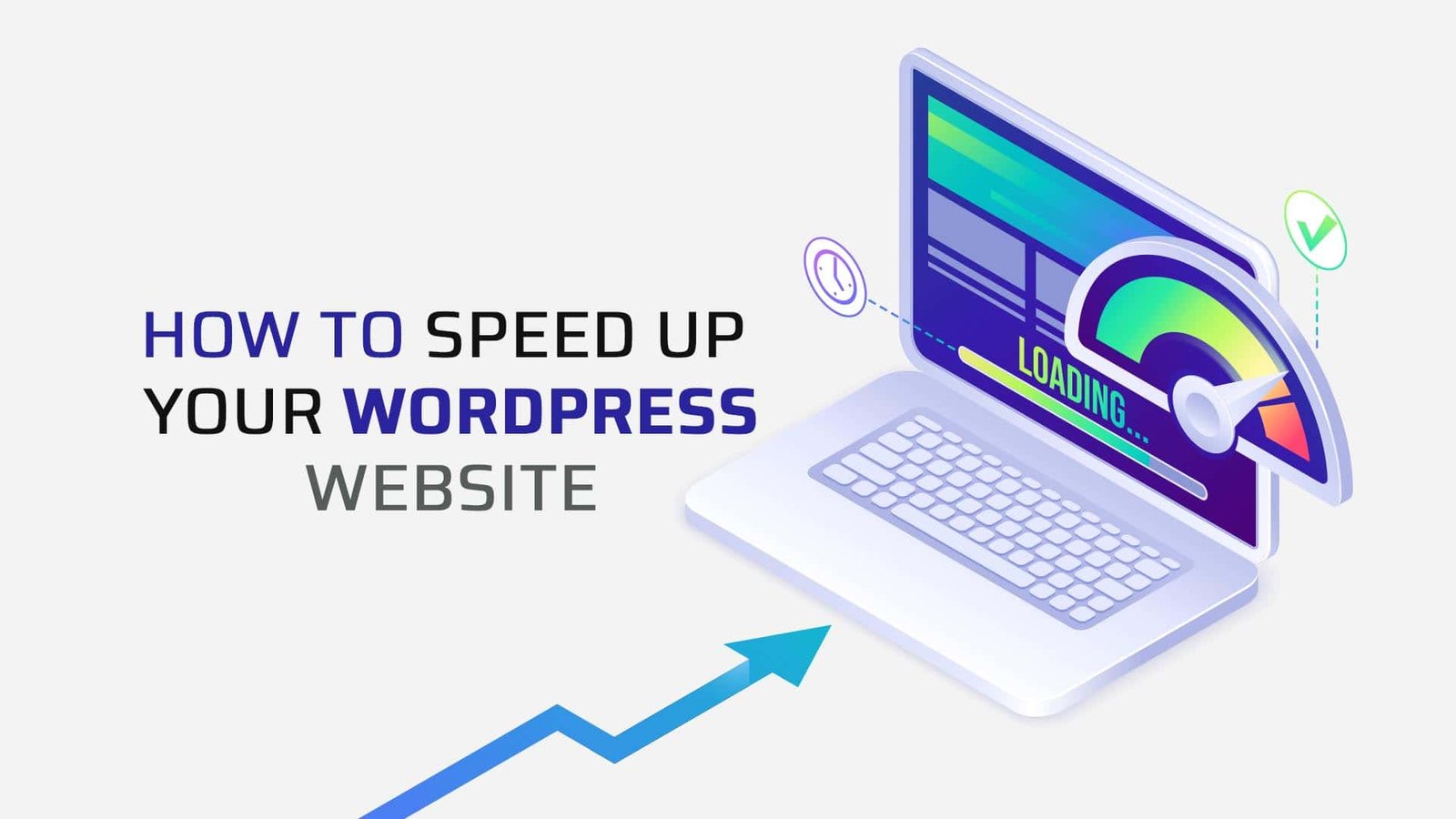When your WordPress website is slow, it is not just annoying for visitors — it’s silently damaging your traffic, conversions and search engine rankings. Research shows that over 50% of users will abandon a site if it takes more than three seconds to load. That’s why it’s essential to learn How to Speed Up Your Website WordPress : 10 Proven Techniques that truly work.
This comprehensive guide on How to Speed Up Your WordPress Website: 10 Proven Techniques is designed for WordPress website owners, bloggers, small business owners, and digital marketers who want to take WordPress speed optimization seriously. Whether you are looking for ways to achieve seamless performance, these techniques will help you.
In this guide, we’ll break down How to Speed Up Your WordPress Website: 10 Proven Techniques into simple, actionable steps so you can speed up your WordPress website effectively and sustainably.
Table of Contents
Why Is WordPress Speed Optimization Important?
Before we dive into How to Speed Up Your WordPress Website: 10 Proven Techniques, it’s vital to understand why Website speed optimization is essential for your online success. A slow website does more damage than you might think — from lost visitors to lower search engine rankings. Here’s why mastering how to speed up your website should be a priority:
Better User Experience
A slow-loading website frustrates users, increases bounce rates, and leaves a negative impression. Today’s internet users expect instant results — if your site lags, they’ll quickly move on. By learning How to Speed Up Your Website, you can deliver a smooth, seamless browsing experience that keeps visitors engaged.
Higher Conversions
Website speed directly impacts conversions. Research shows that even a one-second delay in page load time can reduce conversions by 7%. For eCommerce and business sites, this means potential sales are slipping away.
SEO and Google Rankings
Website speed is a crucial ranking factor in Google’s algorithm. A slow site can push you down in search results, making it harder for potential customers to find you. Implementing How to Speed Up Your Website ensures you’re not just faster, but also more visible in organic search. Fast-loading sites win the SEO game — this is where WordPress speed optimization services can give you an edge.
Positive Brand Perception
Visitors associate fast websites with professionalism and reliability. On the other hand, slow sites can make your brand look outdated or untrustworthy. Learning how to speed up your WordPress website helps strengthen your brand image and build customer loyalty.
Mobile Optimization
With mobile browsing on the rise, speed matters more than ever. Slow mobile sites drive users away. By applying How to Speed Up Your WordPress Website: 10 Proven Techniques, you ensure your site performs well across all devices, especially on mobile where speed is critical.
Cost Savings
Slow websites consume more server resources, leading to higher hosting costs. Plus, low conversion rates mean missed revenue. With proper WordPress speed optimization, you can reduce these costs and maximize profitability. If DIY techniques feel overwhelming, consider WordPress speed optimization services for expert help.
SEO Benefits Revisited
As you implement How to Speed Up Your WordPress Website: 10 Proven Techniques, you’ll see improvements in page load time — a critical metric for Google and other search engines. Faster pages mean higher rankings, more organic traffic, and ultimately, greater business success.

How to Speed Up Your WordPress Website: 10 Proven Techniques
If you’ve been wondering how to speed up your WordPress website: 10 proven techniques can help you achieve faster load times, better SEO, and improved user experience. Let’s dive into these WordPress speed optimization techniques that can transform your site’s performance.
Choose a Fast & Reliable Hosting Provider
Your hosting service lays the foundation for WordPress speed optimization. A slow server equals a slow website. Investing in high-quality hosting is the first step in how to speed up your WordPress website: 10 proven techniques. Consider managed WordPress hosting or cloud hosting for better performance.
Use a Lightweight WordPress Theme
Not all themes are built for speed. Choose a well-coded, lightweight theme that supports WordPress speed optimization best practices. Avoid overly complex themes with bloated code — simplicity often wins when figuring out how to speed up your website WordPress.
Install a Caching Plugin
Caching is a must for anyone serious about how to speed up your WordPress website. A plugin like WP Rocket or W3 Total Cache stores static versions of your site, drastically reducing load times. Caching is at the heart of how to speed up your WordPress website: 10 proven techniques.
Optimize Images
Large, unoptimized images are one of the biggest culprits behind slow sites. How to speed up your website techniques wouldn’t be complete without image compression. Use tools like ShortPixel or Smush to reduce image sizes without sacrificing quality — a key part of WordPress speed optimization.
Minify CSS, JavaScript, and HTML
Another core principle in how to speed up your website techniques is minification. Minifying code removes unnecessary spaces and characters, reducing file sizes. Many caching plugins or tools like Autoptimize can handle this for you.
Use a Content Delivery Network (CDN)
A CDN distributes your site’s content across servers worldwide, delivering data from the nearest location to your user. This technique is vital in how to speed up your WordPress website and ensure global visitors enjoy fast load times. Services like Cloudflare or BunnyCDN are great choices.
Limit Plugins and Remove Unnecessary Ones
Too many plugins can slow your site. One of the easiest steps in how to speed up your website techniques is to audit your plugins. Deactivate and delete those you don’t need and find multifunction plugins that can reduce bloat.
Optimize Your Database
Over time, your WordPress database can accumulate unnecessary data like spam comments, post revisions, and transient options. Database optimization is a smart move in how to speed up your website techniques. Use plugins like WP-Optimize or do it manually via phpMyAdmin.
Enable Lazy Loading
Lazy loading delays loading images and videos until they’re needed. This reduces the initial load time, helping you master how to speed up your WordPress website. WordPress core and many optimization plugins now offer built-in lazy loading.
Keep Everything Updated
Finally, staying updated is part of how to speed up your WordPress website. Always update your core WordPress, themes, and plugins to ensure optimal performance and security. Outdated components can slow your site and introduce vulnerabilities.
Best Plugin for WordPress Speed Optimization
When it comes to accelerating your website, choosing the best plugin for WordPress speed optimization is essential. The right plugin can help reduce load times, improve user experience, and support your efforts to rank higher in search engines. Below, we break down some of the top plugins that can dramatically enhance your WordPress performance.
LiteSpeed Cache (LSCache)
If you’re hosting your site with providers like Hostinger, LiteSpeed Cache is a natural choice. It integrates seamlessly with LiteSpeed servers and offers an all-in-one solution for caching, minifying CSS/JS, lazy loading images, database optimization, and more.
Why it’s great:
- Server-level caching for ultra-fast page loads
- Built-in image optimization
- Free QUIC.cloud CDN integration
WP Rocket
WP Rocket is considered one of the most user-friendly WordPress performance plugins. It’s a premium tool that delivers powerful optimization with minimal setup. Even non-technical users can activate key features in a few clicks, making it perfect for beginners and pros alike.
Why it’s great:
- Page caching, browser caching, and GZIP compression
- Delay JavaScript execution for faster initial loads
- Database cleanup options
W3 Total Cache
W3 Total Cache is a well-established plugin that offers advanced caching and CDN integration. It gives you granular control over every aspect of your site’s performance. While the setup can be complex, it’s highly effective when configured correctly.
Why it’s great:
Extensive caching options (object cache, fragment cache)
Minifies and combines CSS and JavaScript files
Supports multiple CDN providers
Autoptimize
Autoptimize focuses heavily on code optimization — a vital part of speeding up WordPress. It aggregates, minifies, and caches scripts and styles, injects CSS in the page head, and can lazy-load images and optimize Google Fonts.
Why it’s great:
- Excellent for reducing file size and improving load speed
- Works well alongside caching plugins
- Lightweight and simple
Smush
Images can slow down your website dramatically if not optimized. Smush is a leading image compression plugin that helps reduce image file sizes without losing quality — an easy win for site performance.
Why it’s great:
- Bulk image optimization
- Lazy load feature
- Automatic resizing of oversized images
Why Use a Speed Plugin for WordPress?
Using a speed optimization plugin for WordPress helps automate many of the technical tasks that would otherwise require coding knowledge. These plugins handle caching, file compression, image lazy loading, and more — giving your website a significant speed boost without hours of manual setup.
No matter which plugin you choose, make sure it aligns with your hosting environment and site goals. Some plugins are better suited for dynamic sites with frequent updates, while others excel on static or content-heavy websites.
Frequently Asked Questions (FAQs)
Q1: Why is website speed important for my WordPress site?
Website speed directly impacts user experience, search engine rankings, and conversion rates. A fast-loading site keeps visitors engaged, reduces bounce rates, and signals to search engines that your site is high quality and user-friendly.
Q2: How can I test my WordPress website’s speed?
You can use free tools like Google PageSpeed Insights, GTmetrix, or Pingdom to analyze your site’s loading time and receive suggestions for improvement. These tools provide detailed reports on what’s slowing down your site.
Q3: Do speed optimization plugins really make a difference?
Yes, speed optimization plugins automate critical tasks like caching, code minification, and lazy loading. When configured correctly, they can significantly reduce your page load times and improve overall performance without the need for advanced coding.
Q4: Will speeding up my WordPress website affect its design or functionality?
No — if done properly. The goal of how to speed up your WordPress website: 10 proven techniques is to enhance performance without compromising your site’s design, features, or functionality. Always test changes on a staging site first to avoid disruptions.
Q5: Is upgrading my hosting plan necessary to improve speed?
While many optimizations can be achieved with plugins and settings, sometimes a slow server is the root cause. Upgrading to a better hosting plan or switching to a provider optimized for WordPress can provide a noticeable speed boost.
Q6: How often should I check and optimize my WordPress site’s speed?
It’s recommended to check your site’s speed at least once every few months or after major updates. Ongoing monitoring ensures your site stays fast even as you add new content, plugins, or features.
Conclusion: Supercharge Your WordPress Website Today
In today’s fast-paced digital world, having a sluggish website can cost you valuable visitors, customers, and revenue. The good news is that you now have the knowledge and tools to take action. By following these 10 proven techniques, you can dramatically improve your WordPress website’s loading times, enhance user experience, and boost your search engine rankings.
From optimizing images and leveraging caching, to using a reliable hosting provider and cleaning up unnecessary plugins — every step you take towards WordPress speed optimization brings you closer to a faster, smoother, and more successful site. Remember, speed isn’t just a technical metric — it’s a competitive advantage that can help you stand out in your niche.
If you want expert help in implementing these strategies, consider professional WordPress speed optimization services to save time and ensure your website reaches peak performance. Don’t let a slow site hold your business back — take charge today and deliver the lightning-fast experience your visitors expect.


0 Comments